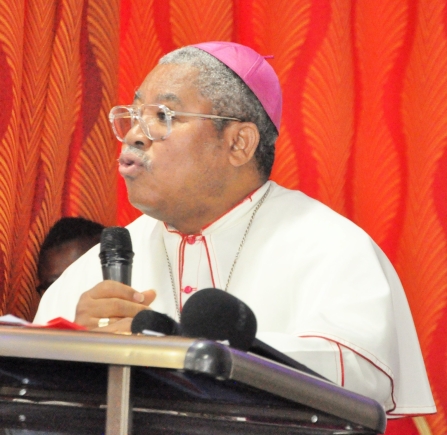
High property rates on faith-based health facilities not in national interest
The Catholic Bishop Responsible for Health, Most Rev. Peter Paul Yelezuome Angkyier, has expressed misgivings over what he describes as substantial property rates imposed on Catholic health facilities, saying the trend is undermining service delivery to the public.
“While we understand the need for local authorities to generate revenue to match budgets, it is unreasonable to levy such high charges on buildings primarily used for public healthcare,” he added.
Bishop Angkyier, who is also the Catholic Bishop of Damongo, was opening the 19th National Conference of the Catholic Health Service Trust in Ho last Wednesday.
The two-day event, on the theme: “Positioning the Catholic Health Service Trust in an advancing technological era II’, was attended by 200 workers from the various Catholic health facilities in the country.
Bishop Angkyier maintained that the assemblies, as state bodies, could serve the national interest better if they recognised the importance of collaboration in providing healthcare.
Meanwhile, the Catholic Bishop for Health said the Ghana Health Service’s network of practice was being implemented with minimal involvement of the faith-based sector at the policy level.
That, he said, raised serious concerns about the effective implementation of the policy, considering the fact that faith-based institutions often served as integral components of local healthcare delivery systems.
Inclusion
For, instance, Bishop Angkyier pointed out that some Catholic health facilities were district hospitals, and that without their proper inclusion, the policy was unlikely to achieve its full potential, especially given its crucial link to patient referrals.
“The faith-based sector’s role cannot be overlooked, even momentarily, and this issue requires serious attention before the policy becomes one of those initiatives that cannot be sustained,” he cautioned.
Touching on illegal mining (galamsey), Bishop Angkyier said the problem was ultimately a serious health threat to the citizenry, as its harmful consequences would significantly increase health expenditure for individuals, families and the state.
Moreover, it would place additional burden on the already overstretched healthcare workers, he added.
Regional Minister
The Volta Regional Minister, Dr Archibald Yao Letsa, earlier said the values of the Catholic Health System had been a pillar of healthcare in Ghana for decades.
In addition to direct healthcare services, the Catholic Church had played an instrumental role in training health professionals, he acknowledged.
Further, Dr Letsa said the Catholic Health System was rooted in an ethic of care that treated the whole person, body, mind, and spirit not as mere statistics, but as human beings deserving of respect, dignity and compassionate care.
“This holistic approach, combined with an emphasis on quality and professional excellence, has allowed Catholic health institutions to remain trusted healthcare providers,” said the regional minister.
On technologies, Dr Letsa said, their roles in healthcare, such as Telemedicine Electronic Health Records and mobile health platforms could not be ignored.
Such innovations held the potential to radically transform healthcare service delivery and Catholic healthcare service providers must strategically integrate those tools into their operations to ensure their services remained relevant and effective in the advancing era.
Dr Letsa said those technologies could help to reduce disparities in access to healthcare, particularly in rural areas where specialists’ service healthcare was often limited.
However, he reiterated that measures needed to be put in place to ensure that staff were trained to operate the new technologies effectively.
The National Director of the Catholic Health Service Trust, George A. Adjei, highlighted the need for continuous surveillance for potential communicable diseases in communities, such as the Marburg virus reported in the DR Congo recently, and the emerging monkey pox cases in the country.
He explained that due to international interactions between nations, those diseases could spread rapidly.
Therefore, he said, it was crucial to institutionalise disease surveillance in healthcare facilities and communities, and go by the protocols for reporting suspected cases to district and municipal health authorities for further action.
Currently, there are 51 Catholic hospitals, 96 clinics and polyclinics, 11 health training health institutions, two diocesan health pharmacies, five specialised facilities in the country, in addition to the Catholic Medicines Centre and the Pooled Procurement Programme.
The conference’s topics included: Medical equipment and network of practice policy, Feasibility and challenges of equipment sharing under network of practice policy, Regulation of medical devises and equipment.
Other topics were, Role of radiation protection, Experiences with modern equipment in healthcare, and Role of medical devices and equipment in patient safety.
